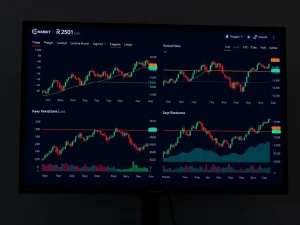Bitcoin Rent: 5 Revolutionary Cities Where You Can Seamlessly Pay Rent with Crypto

Are you a remote worker or digital nomad seeking ultimate financial flexibility? The concept of paying rent entirely in Bitcoin is no longer a futuristic dream. Indeed, it has become a tangible reality in many progressive urban centers globally. Many individuals now seek opportunities for Bitcoin rent, aiming to streamline their financial lives. This revolutionary shift offers convenience, security, and global accessibility for tenants worldwide. It also provides landlords with efficient payment solutions.
For years, traditional banking systems posed challenges for international tenants. High fees and slow transfers were common issues. However, technological advancements and increased cryptocurrency adoption have changed this landscape. Major financial centers and crypto-friendly coastal towns now embrace digital currencies. Landlords and property managers increasingly accept Bitcoin as a convenient payment method. This article explores why paying rent with Bitcoin has gained popularity. It also highlights the top five cities leading this trend. Furthermore, it discusses emerging hotspots and provides practical advice on securing your next digital nomad rent.
Why Paying Rent with Bitcoin is Booming
As cryptocurrencies achieve mainstream acceptance, Bitcoin emerges as a powerful alternative payment option. Beyond trading and investing, renting property with Bitcoin offers distinct advantages for both tenants and landlords. This innovative approach simplifies transactions. It also introduces new levels of transparency and efficiency.
The Rise of Blockchain-Powered Property Management
Blockchain technology fundamentally transforms property management. Rental platforms integrated with blockchain-based smart contracts automate lease agreements. They streamline payments and reduce disputes. Moreover, these systems ensure transparency and security for all parties involved. This innovation builds trust between landlords and tenants globally. It timestamps payments and automates terms, making agreements clearer. Such advancements are crucial for the growing demand to pay rent with Bitcoin.
Near-Instant Settlements and Global Accessibility
Bitcoin enables near-instant settlements. This eliminates delays and reduces banking fees, although users pay a small gas fee for Bitcoin transactions. This speed is invaluable for international tenants. It also benefits property owners managing cross-border properties. Traditional wire transfers often take days. Bitcoin transactions, conversely, clear in minutes. This efficiency makes international rental agreements significantly smoother. It also enhances the overall experience of managing crypto rentals.
Avoiding Costly Currency Conversions
Paying rent in Bitcoin helps tenants avoid expensive fiat currency conversions. International transfers frequently incur significant exchange rate fees. They also involve hidden charges. Bitcoin transactions bypass these costs. According to YCharts, the average cost of a Bitcoin transaction was $1.064 on July 27, 2025. This cost-effectiveness makes Bitcoin an attractive option for cross-border payments. It particularly benefits digital nomads. Despite these benefits, tenants and landlords must consider Bitcoin’s fluctuating value. They also need to understand jurisdictional laws. Consequently, informed decisions are vital.
Direct vs. Indirect Bitcoin Payments for Rentals
Depending on the region and preferences, tenants can pay rent directly or indirectly using Bitcoin. Both methods offer unique benefits and considerations. Understanding these differences is crucial for effective Bitcoin payments.
In **direct crypto payments**, the tenant sends Bitcoin (or another cryptocurrency) straight to the landlord’s digital wallet. The payment remains in cryptocurrency unless the landlord later converts it to fiat. This method is fast, features low fees, and is fully decentralized. However, both parties face risks from price fluctuations. Potential tax complications also exist. This method suits situations where both parties are comfortable with cryptocurrency. It also works best where local laws fully support such transactions.
Conversely, **indirect crypto payments** involve a third-party service. Companies like BitPay, Coinbase Commerce, or specialized rental platforms handle the transaction. The tenant pays in cryptocurrency. The landlord, however, receives fiat currency, such as USD or EUR. This approach protects landlords from price volatility. It also simplifies financial record-keeping. Tenants still benefit from using digital currencies. Indirect payments reduce regulatory challenges. They are more convenient for landlords unfamiliar with digital assets. Global co-living networks now accept Bitcoin, providing flexible housing for those avoiding traditional bank setups.
Top Five Cities for Seamless Crypto Rentals
The prospect of paying rent with Bitcoin is becoming a reality in an increasing number of cities worldwide. These urban centers lead the charge in Bitcoin rental adoption. They offer robust infrastructure and a growing community for crypto rentals.
1. Miami, Florida, United States
Miami hosts the annual Bitcoin Conference. The city enjoys strong support for crypto from local leadership. Former Mayor Francis Suarez even chose to receive his municipal salary in Bitcoin. Several luxury condo developers and apartment projects, such as The Rider Residences in Wynwood, accept cryptocurrency payments for purchases. In April 2025, a crypto transaction occurred for a unit there directly between digital wallets. Although dedicated rental platforms are not yet widespread, tenants can negotiate with landlords. They can propose monthly rent payments in Bitcoin. In Downtown, Brickell, or Wynwood, select properties may be available for Bitcoin-based rentals. Miami’s progressive stance makes it a prime location for those seeking to pay rent with Bitcoin.
2. Lisbon, Portugal
Portugal introduced new rules regarding crypto-backed property purchases and sales in April 2022. This established clear procedures. Lisbon has a growing digital-nomad network. Consequently, crypto services designed to support them are increasing. As reported on July 12, 2025, RentRemote partnered with BitPay to accept cryptocurrency as rent payment. While most transactions still convert Bitcoin to euros for legal settlement, many property sellers, developers, and agencies are open to accepting crypto. Property rentals in Bitcoin may be available in Lisbon’s prime neighborhoods like Chiado, Alfama, and the startup districts. Tenants paying in Bitcoin usually work via notaries or brokers. These professionals handle conversion and compliance, making Bitcoin rent feasible where both parties agree.
3. Berlin, Germany
Berlin features a progressive real estate sector. It facilitates indirect Bitcoin rental adoption in several cases. Flatio, a European short-term rental service, accepts Bitcoin payments in Berlin for stays lasting one to six months. Modest service fees may apply. Since April 1, 2023, Germany’s Money Laundering Act has prohibited direct crypto-based property purchases. However, renting remains possible. Parties agree to use intermediary services that convert Bitcoin to euros before payment clears. Berlin continues to attract tenants who prefer flexibility regarding payments. This makes it a significant hub for Bitcoin payments in the rental market.
4. Toronto, Ontario, Canada
Canada’s property landscape gradually embraces Bitcoin. Some rental platforms in Toronto have enabled Bitcoin rent payments. Tenants can pay in Bitcoin while landlords receive fiat via exchange services. Residents can book services, dinners, and rent using crypto throughout the city. While directly accepting Bitcoin as rent may still be a niche, the infrastructure exists. It supports crypto-savvy tenants. Some services handle conversion, invoices, and transparent transaction flows. Toronto offers a promising environment for those looking to secure their digital nomad rent with crypto.
5. Paris, France
Paris quickly catches up with crypto hotspots. It facilitates crypto-based rentals. Agencies like Lodgis, specializing in furnished and short-term rentals, have offered clients the option to pay agency fees in Bitcoin since 2014. Real estate platforms now enable lease agreements or property sales in France using Bitcoin. They ensure compliance through PSAN-certified partners and notaries. While full rent-in-Bitcoin rentals are rare, tenants and landlords often find workable options. Paris represents a growing opportunity for innovative rental solutions.
Expanding Horizons: Bitcoin Payments in Emerging Hubs
People are increasingly open to using digital assets like Bitcoin and Ether (ETH) for rent and deposits. This signals a significant shift in real estate transactions. Beyond the major cities, smaller, dedicated crypto communities also drive this adoption. These locations highlight the global reach of Bitcoin payments.
El Zonte, El Salvador: Bitcoin Beach
El Zonte, known as “Bitcoin Beach” in El Salvador, pioneered community-wide Bitcoin adoption. This influence led to the country’s 2021 decision to make Bitcoin legal tender. Currently, studios or boutique apartments near the beach can be rented with payment in Bitcoin or any other acceptable cryptocurrency. Ocean-view properties with Bitcoin payment options are readily available. Despite its modest infrastructure, this lively surf town continues to draw crypto-savvy digital nomads. They seek a Bitcoin-integrated lifestyle. This unique environment makes El Zonte a true pioneer for Bitcoin rent.
Rosario, Santa Fe, Argentina: A Groundbreaking Lease
In early 2024, Rosario, Argentina’s third-largest city, hosted the country’s first rental agreement denominated in Bitcoin. Under this groundbreaking lease, the tenant agreed to pay the equivalent of $100 per month in Bitcoin. The local crypto platform Fiwind facilitated this. It converted USDT to Bitcoin and transferred it to the landlord’s wallet. This milestone followed pro-crypto reforms by President Javier Milei’s administration. A December 2023 deregulation decree allowed contracts in Bitcoin and other cryptocurrencies. However, the Argentine Congress did not approve the president’s crypto reforms, which were later dropped. Argentina continues to treat crypto under its standard tax regulations. It lacks the deregulated regime Milei initially envisioned. Nevertheless, this event showcased the potential for widespread pay rent with Bitcoin adoption.
Finding Your Next Digital Nomad Rent with Bitcoin
Securing a Bitcoin-friendly rental requires strategic searching and careful negotiation. Several resources and practices can help you find your ideal digital nomad rent.
You can use crypto real estate platforms and local blockchain-based rental apps. These specialized platforms list properties that accept Bitcoin and other cryptocurrencies. Some agencies or landlords may even offer discounts to long-term tenants who pay with Bitcoin or stablecoins. During negotiations, confirm several key details. Verify conversion rates, payment schedules, and whether rent is tied to a specific cryptocurrency. Transparency in these agreements is paramount.
For enhanced security, consider using escrow services. These services hold funds until both parties meet the agreed terms, significantly reducing the risk of fraud. Always verify the landlord’s credibility. Request references or property documents. Remember, cryptocurrency transactions are irreversible. Where feasible, use smart contracts to automate payments. This protects both parties by ensuring terms are met automatically. By following these steps, you can confidently navigate the emerging market of Bitcoin-friendly rentals.
The global real estate landscape is undeniably shifting. Bitcoin offers unparalleled convenience and flexibility for tenants and landlords alike. As technology advances and adoption grows, paying rent with Bitcoin will likely become an increasingly common practice. Embrace the future of rentals today!










